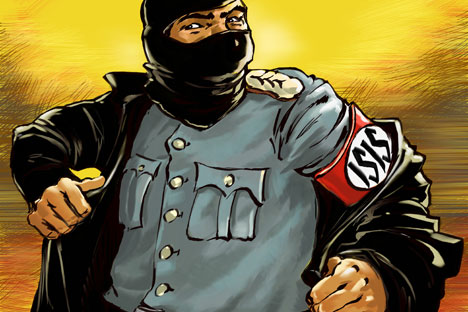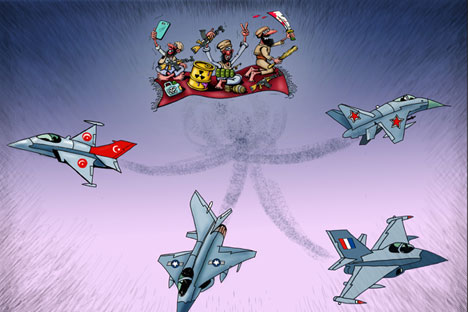Former allies should make united front against ISIS fascism

I have worked for the past 28 years in international economic development. Before I came to Russia in 1992 I covered Indonesia. There, my opposite number from the Indonesian government would listen attentively to all I had to say on strategy and development and, at the end of each homily, he would say: “Then what?”
The votes on Syria are counted, the decision taken, the first missions carried out. The remit of the British armed forces (the RAF anyway) has been extended. Then what?
My late father, Admiral of the Fleet Terry Lewin, was a Chief of the British Defense Staff. While visiting Australia and New Zealand in 1982, he received the news that the Falkland Islands had been invaded by Argentina. Flying back, he had time to think. He recalled the debacle of Suez in 1956. Then, a hastily taken decision by the British government of the day resulted in a mission in which the armed forces were badly let down; let down by the absence of any policy to back up the military intervention. No one had thought to ask: “Then what?” He was determined not to fall into this same trap.
Arriving back in Britain, he was shown into the Downing Street Cabinet Room where Margaret Thatcher and her senior ministers were waiting. “Prime Minister, you are going to need to establish a clear objective to this campaign,” he told them. “Here is one I have prepared for you”. The objectives were immediately adopted; “Then what?” was answered.
Subsequently, the relationship between the combined military under his command and the Government ran along clearly defined lines of responsibility, desired outcomes crystallized as policy.
I am not a military person; I am a professional businessman and amateur historian. As a historian I have learned from the global conflicts of the past century a few object lessons. The first, a prerequisite in any modern conflict, is gaining air supremacy. No force can succeed in a ground war if the enemy controls the air. Yes, the carpet bombing of Vietnam, Laos and Cambodia only forced the other side underground, but there is much more to modern air supremacy than tipping thousands of tons of bombs indiscriminately out of high-flying aircraft. Precision attacks from the air on specific military targets are a world away from this.
However, it’s not enough for what passes as the “Allied coalition” to engage in this most dangerous of pursuits without proper and effective combined leadership. The loss of a Russian military aircraft recently, while perhaps revealing a deep-seated problem between Russia and Turkey, can best be described as a friendly fire incident. This should never happen again. The enemy has no air power; the only aircraft over Syria are fighting for the same cause.
In the past, there have been countless examples of close working partnerships with Russia at the military level regardless of political tensions. In Parliament, the Shadow Foreign Secretary Hilary Benn described ISIS in Syria as fascist: he was right. To Russians, this term triggers a massive resonance with the Second World War, when 27 million Soviet citizens gave their lives to defeat European fascism. To be reunited with old allies against this latest global menace is an opportunity for rapprochement that we should not miss.
For the past decade or more, the British embassy in Moscow has helped send a group of old soldiers from Russia to meet their British counterparts to celebrate VE Day. These old men would be the first to tell their modern leaders to get their act together and instill a better command structure to get the job done as quickly and effectively as possible. There can be no “them and us” in this situation, whatever our differences. We are once again allied with the Russians in a noble cause; we need to make it work.
Another lesson learnt from my father was that there is a heavy price to pay for any military intervention. After presenting Thatcher with the clear objectives for the Falklands conflict, the PM turned to him and asked: “Terry, can we really do this?” He replied: “Yes, but you must be prepared for losses.” Losses in Syria, losses to our “Allied forces” will be the very first “Then what?” of this conflict.
Russia has already experienced losses; so have our Arab allies in the battle for Syria. No one knows how long this war will continue but of one thing we can be pretty sure: there will be losses. Now as then, we must be prepared for them.
To die fighting the enemy is one thing; to be killed fighting each other is something else entirely. Even more, when victory is ultimately won, and the world asks, “Then what?” we’d better be sure – all of us – that we have the answers.
Tim Lewin is an organizer and consultant for major financial, cultural and arts projects in Russia and Ukraine, and between 2003-2014 was the Honorary Consul in the UK for cultural and business affairs of The Autonomous Region of Crimea, when the peninsula was under Ukrainian rule.
The opinion of the writer may not necessarily reflect the position of RBTH or its staff.
More: How is Russia keeping its planes safe in the Syrian skies?
All rights reserved by Rossiyskaya Gazeta.
Subscribe
to our newsletter!
Get the week's best stories straight to your inbox
